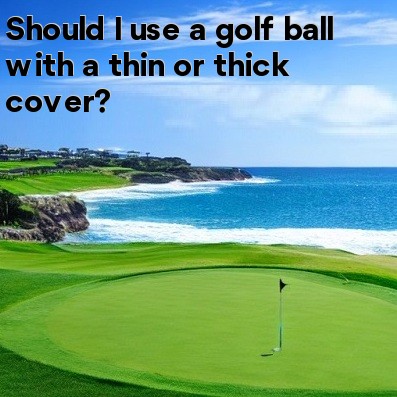
Should I use a golf ball with a thin or thick cover?
Choosing the right golf ball for your game can have a significant impact on your performance on the course. One of the key factors to consider is the thickness of the ball's cover. Both thin and thick covers have their advantages and disadvantages, so let's take a closer look at each option.
- Thin Cover:
- A golf ball with a thin cover is usually made of urethane material, which provides a soft feel off the clubface.
- Thin covers are typically more spin-friendly, allowing skilled golfers to have better control over the ball's flight and spin.
- These balls tend to generate more greenside spin, making it easier to stop the ball on the green.
- However, thin covers are also more prone to scuffs and cuts, which can affect the ball's performance and durability.
- If you are a low-handicap player who prioritizes control and spin, a golf ball with a thin cover might be the right choice for you.
- Thick Cover:
- Golf balls with thick covers are typically made of Surlyn or a similar material, offering durability and resistance to scuffs.
- Thick covers provide a firmer feel off the clubface, resulting in more distance off the tee.
- These balls are more forgiving and tend to produce less spin, making them suitable for golfers who struggle with slice or hook tendencies.
- The durability of thick-covered balls means they can last longer before needing replacement.
- If you prioritize distance and durability over control and spin, a golf ball with a thick cover might be more suitable for your game.
Ultimately, the decision between a thin or thick cover comes down to your skill level, swing speed, and the aspects of your game that require improvement.
If you have a high swing speed and a consistent ball-striking ability, a thin-covered ball can offer excellent shot-making capabilities and enhance your control around the greens. Players who prefer a softer feel and prioritize workability in their shots will also benefit from a thin cover golf ball.
On the other hand, if you struggle with maintaining a straight ball flight or frequently find yourself losing balls due to scuffs, a thick cover ball offers durability and forgiveness. Golfers who prioritize distance and overall reliability will find a thick-covered ball more suitable for their game.
In conclusion, there is no one-size-fits-all answer to whether you should use a golf ball with a thin or thick cover. It is essential to consider your own playing style, skill level, and specific needs to make an informed decision. Experiment with different options and see how they affect your overall performance on the course.





